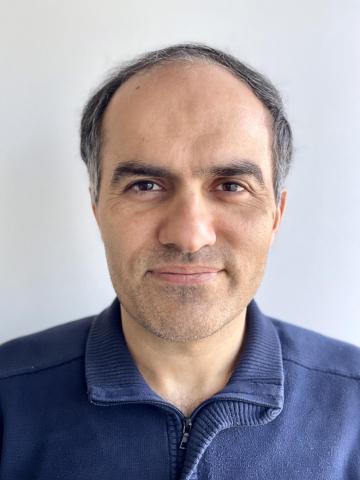Hossein Miri Lavasani, an Assistant Professor in Case Western Reserve University’s Department of Electrical, Computer, and Systems Engineering and a Human Fusions Institute affiliated faculty member, recently received a CAREER Award from the National Science Foundation. He was among 500 young investigators across the United States to receive NSF’s flagship award for early career researchers.
Lavasani will receive $500,000 over five years for his project, CAREER: AI-Enabled Self-Healing and Trusted Wireless Transceivers for Biomedical Applications. Throughout the five years, he plans to create a transceiver for biomedical applications with embedded security, adding measures to protect patient privacy and ensure transmissions come from trusted sources.
As the project continues, Lavasani will focus more on self-healing and increasing the reliability of transceivers that will be used for biomedical applications, whether wearable or implanted. “We want to ensure these devices are reliable and will last long,” he said. He hopes to establish himself as one of the few researchers working on the security aspect of circuits for biomedical applications. “Most people believe that security has to be done in the digital domain, but we have a vision that we will do it in the analog domain,” he said. “We think it will be more energy efficient and faster.”
Artificial intelligence (AI) will benefit both security and self-healing. In security research, AI will deal with attacks from adversaries. On the self-healing side, AI will try to detect problems that might appear in devices, predict future performance impacts, and take corrective measures.
Toward the end of the grant, Lavasani hopes to perform experiments on large animals. He has not previously worked with implants but plans to collaborate with faculty in CWRU’s Department of Biomedical Engineering. However, the project will primarily focus on transceiver design, which is the expertise he brings to HFI. He sees this project as a springboard for collaborating with others to get secure wireless technology and to do more sensor research.
“I am very happy and honored to have received this award and very thankful for everyone’s support at CWRU,” said Lavasani. He thanked HFI Director Dustin Tyler for feedback on his application and HFI-affiliated faculty member Michael Fu, a past CAREER award recipient, for answering his questions. He also acknowledged his department chair, Professor Pedram Mohseni, for mentoring and being available to accommodate his requests for resources throughout the six-month application process.
“We are all very proud of Hossein and wish him success in pursuing his impactful research over the next five years and beyond,” said Mohseni.


